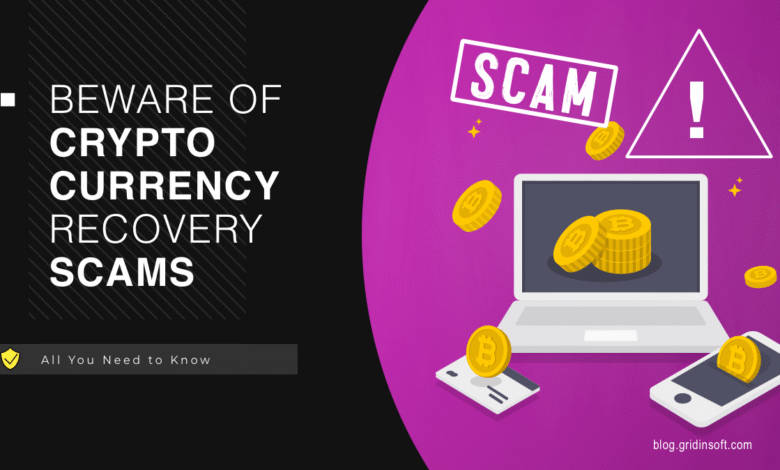Crypto Recovery Scams: FBI Warns About Fraudulent Firms

Crypto recovery scams are a growing concern in today’s digital age, as the FBI warns about fraudulent law firms that claim to offer cryptocurrency recovery services. These deceptive entities prey on individuals who have lost their funds due to earlier scams, luring them in with the promise of recovering their assets. Unfortunately, many victims, particularly the elderly, find themselves even deeper in deception when approached by these scammers, who often utilize the language and tactics of legitimate organizations to gain trust. Recently, the FBI has emphasized the importance of a rigorous zero-trust approach, advising individuals to thoroughly investigate any claims made by such firms before providing personal information. With scams targeting cryptocurrency on the rise, it is crucial to stay informed and vigilant to protect your investments and personal data.
In the ever-evolving landscape of digital finance, the proliferation of fraudulent recovery schemes has become a pressing issue for investors. Known as cryptocurrency recovery scams, these deceptive operations often masquerade as legitimate services that promise to retrieve lost digital assets for victims of previous frauds. Law enforcement agencies, including the FBI, have issued warnings against unauthorized law firms that exploit the vulnerability of those who have suffered financial losses. Additionally, these scams frequently utilize familiar terminology to foster a false sense of security among potential clients, jeopardizing their efforts to reclaim lost funds. As awareness of these schemes spreads, adopting informed practices becomes essential in navigating a safer cryptocurrency environment.
Understanding Cryptocurrency Recovery Scams
Cryptocurrency recovery scams have become increasingly prevalent as individuals face significant challenges in retrieving lost or stolen funds. These scams typically involve impersonators posing as legal professionals or recovery agents who claim they can help individuals regain access to their cryptocurrency assets. Victims are often led to believe that there is a legitimate pathway for recovering their investments, exploiting their desperation and emotional vulnerability in the process.
The tactics employed by these scammers are particularly insidious. They often use names and branding that closely resemble reputable law firms or established financial institutions, creating a facade of credibility. Victims are then engaged with promises of legal action or mediation with banks to get their funds back. This complex web of deceit highlights the need for stringent verification processes when engaging with any so-called recovery services, as many of these entities are nothing more than fronts for fraud.
Signs of a Fraudulent Law Firm
One of the key indicators of a fraudulent law firm is their lack of transparency and verifiable credentials. Legitimate law firms will have established websites, professional records, and transparent communication channels. In contrast, fraudulent firms may evade direct interactions, use generic email addresses, or fail to provide official documentation when pressed for proof of their credentials.
Moreover, these scammers may employ high-pressure tactics to rush victims into making decisions without sufficient due diligence. They may offer unrealistic guarantees of recovery, claiming insider connections with banks or regulatory bodies, which should raise immediate red flags. Anyone approached by a recovery service should be cautious and ideally consult with a certified professional before taking any action.
The FBI’s Warning on Crypto Fraud
The FBI has issued stern warnings regarding the rise of scams targeting cryptocurrency investors, noting that many of these scams capitalize on the aftermath of prior losses. As outlined in recent PSAs, these fraudulent schemes have gained traction as more people experience the pitfalls of the volatile digital currency market, thus increasing demand for recovery solutions.
This emphasis on the importance of vigilance is echoed by the recommendations from the FBI to adopt a zero-trust approach. Trusting unknown entities—especially those claiming to have connections or the ability to recover lost funds—can lead to further financial losses, as seen in many reported cases. Staying informed and cautious is paramount in a landscape marked by evolving fraudulent activities.
Protecting Yourself from Crypto Recovery Scams
To effectively protect oneself from crypto recovery scams, it is crucial to research any individual or agency offering these services thoroughly. Check for licensing, professional memberships, and online reviews from other users. Engaging in conversation with other victims can provide insights into who to avoid and reinforce the importance of community awareness.
Additionally, individuals should refrain from sharing sensitive information with anyone who approaches them unsolicited. Recovery scams often involve requesting personal data under the guise of recovery efforts, which could lead to identity theft or unauthorized account access. Being proactive in safeguarding your personal information is an essential step in preventing falling prey to such scams.
The Role of Cryptocurrency Recovery Services
Cryptocurrency recovery services can play a critical role in assisting victims of crypto fraud; however, caution must be exercised when engaging with these entities. Reputable recovery services will operate transparently, providing clear processes and verifiable results without making unfounded promises of guaranteed recovery.
Victims should approach these services with the same scrutiny applied to any financial transaction, seeking out services that have demonstrated success through legitimate means. It’s vital to differentiate between those committed to genuine recovery efforts and the multitude of scams aimed at taking advantage of desperate individuals.
Spotting Red Flags in Recovery Offers
When evaluating recovery offers, it is essential to be aware of red flags that could indicate a scam. Promises for immediate recoveries or requests for upfront payments without clear explanations are often signs of fraudulent activity. Legitimate firms will typically outline their process and associated costs transparently, ensuring clients know what to expect.
Furthermore, offers that involve complex schemes or excessive paperwork that lack clarity should be met with suspicion. Most legitimate recovery processes will be straightforward and provide thorough documentation that clients can understand. Always approach any offer with a critical eye and a healthy dose of skepticism.
Consulting With Official Authorities
If an individual suspects they are being targeted by a fraudulent crypto recovery service, it is advisable to consult with official authorities, such as the FBI or local law enforcement, before proceeding further. These entities can provide guidance and help determine the legitimacy of the claims made by the recovery service.
Engaging law enforcement not only aids in reporting the suspicious activity but also contributes to a larger measurement of the severity of these scams, potentially leading to broader protective measures for the community as a whole. Encouraging victims to report their experiences can help authorities combat this growing issue.
The Impact of Scams Targeting Cryptocurrency Investors
Scams targeting cryptocurrency investors have significant impacts, not only on the individual victims but also on the broader market and regulatory landscape. As more individuals fall prey to these scams, it undermines the trust in the cryptocurrency ecosystem, dissuading potential investors from entering the market due to fear of financial loss.
Moreover, these scams often result in increased scrutiny from regulatory bodies, which may lead to stricter regulations that could hamper the innovative landscape of blockchain technology. Continuous public education about cryptocurrency scams becomes necessary, focusing on safe investment practices and how to recognize and report fraudulent activities.
Implementing a Zero-Trust Approach to Recovery Requests
In an environment where scams are rampant, adopting a zero-trust approach is one of the most effective strategies for those seeking recovery of lost funds. This approach encourages individuals to treat every interaction with skepticism until proven otherwise, ensuring that they validate the information and credentials of those offering recovery services.
By implementing such a strategy, individuals empower themselves to make informed decisions and reduce the risk of falling victim to fraudulent schemes. A zero-trust approach aligns perfectly with ongoing efforts to combat not only scams involving recovery but also the entire spectrum of fraud associated with the cryptocurrency market.
Frequently Asked Questions
What are crypto recovery scams and how do they operate?
Crypto recovery scams involve fraudulent law firms or agencies claiming they can help recover lost cryptocurrency funds. These scammers often target individuals who have fallen victim to cryptocurrency fraud, particularly the elderly. They use deceptive tactics, such as impersonating legitimate organizations and offering false legal pathways to reclaim assets.
How can I identify a fraudulent law firm that claims to provide cryptocurrency recovery services?
Fraudulent law firms typically exhibit suspicious behaviors, such as aggressive marketing targeting scam victims, fake testimonials, and claims to have connections with government bodies. The FBI cautions individuals to verify any firm’s legitimacy and to be wary of those asking for upfront fees or trying to open new bank accounts for recovery.
What warning did the FBI provide regarding scams targeting cryptocurrency?
The FBI has issued warnings about scams targeting cryptocurrency, specifically alerting the public to fictitious law firms offering recovery services. They emphasize that victims should adopt a ‘zero-trust’ approach and rigorously verify the legitimacy of any recovery claims or individuals promising asset recovery.
Why should I be cautious of cryptocurrency recovery services?
Many cryptocurrency recovery services are scams that exploit victims of previous frauds. These services may mislead individuals into believing they can recover lost funds, while often just collecting personal information or charging fees without any intention of providing genuine assistance.
What steps should I take if I suspect I am dealing with a cryptocurrency recovery scam?
If you suspect you are interacting with a cryptocurrency recovery scam, promptly cease communication with them. Report the incident to the FBI or your local authorities and gather any documentation related to the scam. It is crucial to protect your personal information and assets.
What is the zero-trust approach recommended by the FBI concerning recovery scams?
The zero-trust approach recommended by the FBI entails not automatically assuming any recovery service is legitimate. Individuals should thoroughly investigate the backgrounds and claims of any agency offering cryptocurrency recovery services before engaging with them.
How do scams targeting cryptocurrency affect victims emotionally and financially?
Victims of cryptocurrency scams often experience significant emotional distress, coupled with financial loss. The misleading nature of crypto recovery scams can exacerbate feelings of despair, as victims are further exploited by entities promising recovery that may never come.
Can legitimate law firms assist in recovering lost cryptocurrency?
While there may be legitimate legal avenues to explore for recovering lost funds, victims should exercise extreme caution. It is essential to verify the legitimacy of any law firm and to be cautious of firms that predominantly advertise recovery services for cryptocurrency scams.
What common tactics do scammers use in cryptocurrency recovery schemes?
Scammers often use tactics such as impersonating legitimate firms, creating false testimonials, and referencing non-existent government affiliations to build trust. They may also create elaborate stories about recovery processes that require victims to undertake additional steps, often leading to further financial loss.
How can I protect myself from falling victim to cryptocurrency recovery scams?
To protect yourself, research thoroughly, trust your instincts, and be wary of offers that seem too good to be true. Additionally, limit sharing personal information and ensure any recovery service is validated through reliable sources before pursuing assistance.
| Key Point | Details |
|---|---|
| Fictitious Law Firms | Scammers create fake law firms promising to recover lost cryptocurrency funds. |
| Target Audience | Mainly vulnerable individuals, especially the elderly, who have previously lost funds in scams. |
| Impersonation Techniques | Scammers often use legitimate-sounding names and references (e.g., International Financial Trading Commission) to lend credibility to their claims. |
| Bank Account Manipulation | Victims may be prompted to open new accounts at fake banks to facilitate further fraud. |
| FBI Recommendations | Adopt a ‘zero-trust’ approach; verify any recovery service claims thoroughly. |
| Previous Warnings | This warning follows prior alerts from June 2024 and August 2023 about similar scams. |
Summary
Crypto recovery scams are a significant threat to individuals who have lost access to their cryptocurrency funds. These scams involve fictitious law firms that prey on vulnerable victims, especially the elderly, by promising to recover lost assets. It is crucial for individuals to remain vigilant and verify any claims of recovery services, particularly those that suggest connections to government entities. The FBI’s ongoing warnings highlight the need for cautious engagement in the crypto space to protect personal assets from ongoing fraudulent activities.




